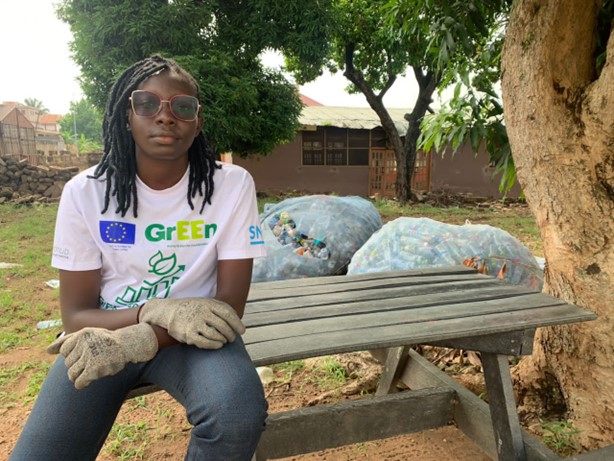According to Organisation for Economic Corporation and Development’s (OECD) projections, sub-Saharan Africa will see a six-fold increase in plastic use by 2060 – which will come with the challenge of managing plastic waste. However, in Ghana one of the young enthusiasts trying to ameliorate the situation by creating jobs and turning plastic waste into useful products, such as furniture, is the Chief Executive Officer (CEO) of Green Ecoworks Limited, Emmanuella Bemah Appiah.
Read on as she shares her journey and inspiration with this week’s Inspiring Startups.
Emmanuella Bemah Appiah holds a Bachelor of Science (Bsc) degree in Marine and Fisheries from the University of Ghana (UG), and is currently undertaking another Bsc in Forest Resources Technology at Kwame Nkrumah University of Science and Technology (KNUST) in Kumasi.

Her company, Green Ecoworks, recycles single-use plastic waste into beams, sheets and blocks that can be used to make furniture, containers and a variety of structures like kiosks, pop-up shops and others. Their products can be recycled multiple times after initial use, which is very sustainable.
Emmanuella started her plastic recycling and waste management business in 2019, collecting plastic waste from her mates in university. From that humble beginning, with her desire and the quest to add her talent to the recycling and sustainability effort, she has employed 10 others to take over the collection process so she can fully concentrate on manufacturing and sales of finished products.
From a distance, the furniture made by Emmanuella looks like wood; but a closer viewing reveals that the dark-brownish outdoor furniture is actually made from recycled plastic.
From her workshop located in Kumasi, she told the B&FT that: “I convert the shredded and recycled plastic waste materials into planks called lumber – a dark-brownish material mimicking natural wood. The lumber forms the basis for all types of furniture I produce, and to combat its deterioration and extend the final product’s lifespan, I fuse it with a non-harmful chemical compound called Ultraviolet (UV) stabiliser”.
The Green Ecoworks CEO said she is currently working on producing and standardising some of the plastic sheets, which when done can be used in place of plywood and tiles, among other applications.
While contributing toward poverty reduction outcomes through plastic waste collection and recycling, she told the B&FT that her job also makes her a promoter of the United Nations’ Sustainable Development Goals on a clean and sustainable environment.

Making a case for its adoption, she pointed out that the end-products of recycled plastic are able to withstand harsh weather conditions such as severe heat and torrential rain, and do not rot like natural wood.
To hone her skill further, Emmanuella has participated in the GrEEn Innovation Challenge where she won €25,000 to expand her production site. Additionally, by dint of hard work she secured a grant of US$2,500 dollars from Impact Hub – an organisation that focuses on prototyping the future of business and society.
Revenue potential
She noted that the plastics sector has a huge revenue generating potential that Ghana can tap into and maximise its economic gains, elaborating that: “A lot of products can be made out of plastic waste, and with determination Ghana is assured of raking-in huge a income out of its sector. World-class products can be manufactured out of it and transported abroad for sale in places where they are in demand”.

Challenges
Aside from lack of financial support and technology, Emmanuella cited low patronage and lack of market – mentioning competition from China.
According to her, the Chinese – aside from having quality shredding machines – have the financial capacity to buy waste plastic irrespective of its cost, and sometimes are able to buy a whole landfill of it; whereas Ghanaian collectors struggle to even get buyers for what they gather.
Way Forward
In the light if this, she has therefore appealed for Ghanaians to patronise products made from recycled plastic waste as a way of encouraging environmental sustainability. She also urged waste management companies and Ghanaians to segregate waste properly, explaining that well-separated plastic waste make it easier for shredding and recycling.
Emmanuella admonished recycling companies to participate in start-up innovation courses and incubation programmes; not only to get themselves investment-ready through structuring their businesses, but also get connected to investors for financial support.
Contact details
Email: [email protected]
Tel: +233550932831
Facebook/IG/Twitter/LinkedIn: @greenecoworks
Website: www.greenecoworks.live










